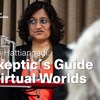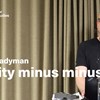raised

Anandi Hattiangadi: A Skeptic's Guide to Virtual Worlds - A response to David Chalmers
Are virtual worlds "real"? Or are they merely "virtual"? In a recent book by David Chalmers, "Reality + - Virtual Worlds and the Problems of Philosophy", he argues that if we in fact were already livi
Moral uncertainty
Philosophy Compass, 12:3 2017. DOI: 10.1111/phc3.12408 Abstract What should we do when we are not certain about what we morally should do? There is a long history of theorizing about decision-making und
Catastrophic risk
in Philosophy Compass (2020) Abstract:Catastrophic risk raises questions that are not only of practical importance, but also of great philosophical interest, such as how to define 'catastrophe' and wha
Are public decisions made by artificial intelligence democratically okay?
Are public decisions made by artificial intelligence democratically okay?The reason this is an important question is that already AI is being used in public decision-making. For example, in social ser
Social Exclusion among Peers: The Role of Immigrant Status and Classroom Immigrant Density.
Journal of Youth and Adolescence. Advanced online publication. DOI: 10.1007/s10964-016-0564-5. Abstract Increasing immigration and school ethnic segregation have raised concerns about the social integrat
The Value of Existence
in: The Oxford Handbook of Value Theory Eds.Iwao Hirose and Jonas Olson, Oxford University Press. Can it be better or worse for a person to exist than not to exist at all? This old and challenging exis
Women in violent extremism in Sweden
Nordic Council of Ministers, 54 pages Women have generally been treated as “side shows” in the literature on war,terrorism and violent extremism and have thus been given scant scholarly attention.In mato be framed as unwitting, passive agents or brainwashed victims pulled into violentextremist movements only through the relations of their husbands, boyfriends, orfathers.

Reality minus minus - James Ladyman, Professor of Philosophy
There is plenty of techno-optimistic takes on virtual worlds. They will offer us opportunity for new and exciting experiences, as real as reality, it is said. But what about the costs? In a talk from

The New World - Martin Hägglund
The Institute for Futures Studies together with Aftonbladet Kultur present The New World - a podcast series where great thinkers think (and talk) about the most pressing issues concerning our future.
Edward Page: Addressing future loss and damage associated with climate change
Edward Page, Associate Professor of Political Theory, University of Warwick ABSTRACTClimate change, by damaging the quality of life of populations already suffering from acute vulnerability and hardshi the adoption of measures of mitigation and adaptation and a ‘second-order injustice’ if the associated losses and damages arise as of these measures. Both forms of injustice involve ‘losses and damages’ arising that would not have occurred but for climate change but raise distinct normative problems given their diverging origins. This research seminar explores some key normative puzzles raised by the new ethics and politics of ‘loss and damage’ as it relates to both first-order and second-order climate change injustice. In particular, the lecture focuses on which normative principles should guide measures seeking to address first-order and second-order climate change injustices experienced by states and how (if at all) new forms of policy can be designed that respect these principles.








